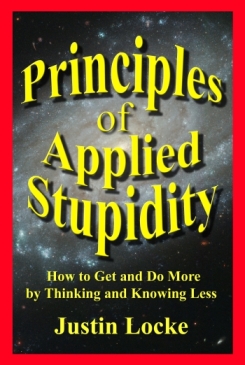Well I am sitting here waiting to hear from the printer so I can see the proof of the cover of the 3rd edition of “Principles” and I thought, well, I can make productive use of my wait time by house cleaning, but why do that when I can blog instead? So here goes.
When “proofing” a book it is very easy to get into a major stress-out, because unless you find and remove all typos, errors, misspelled names, formatting problems, and the other infinite potential screw-ups that occur when you write and publish a book, those errors will be printed out hundreds or even thousands of times and one’s imperfections and mistakes will be out on public view for all to see.
Much of what we learn in school (certainly almost all of what I learned in the music school experience) is merely the art (?) of imperfection concealment. Since so many of my teachers in all courses of study emphasized the importance of not making errors, even if a paper or a presentation was otherwise dull as dishwater, I believed in perfection (read: obedience) as the way to truth and enlightenment; but I have since discovered this is a lot of hogwash. People will spend endless amounts of money to avoid that awful feeling of making a visible error, but in the end, seeking perfection is self-indulgence. It’s a fear of being seen for what you are. And in general, it’s not something that people want to buy.
Of course, the weird lesson I learn, and other people who publish admit to the same thing, you can never get all the errors out of a book. After 5 editions I thought I had all the errors out of Real Men Don’t rehearse but then just last week someone told me that I referred to "Bugler’s Holiday" as being in 4/4 when in fact it is in 2/4. YEESH.
So I approved the proof the text of “Principles” yesterday, even though I found 3 typos in the proof that I obviously hadn’t caught previously. I could have said “stop the presses!!” and fixed these obvious errors, but it would have cost me $60 plus a week’s delay. So the hell with it.
I confess, doing so is very very hard. If I wasn’t under such severe time and financial restraints I would no doubt, out of sheer habit of training in imperfection concealment being the highest priority, have said, “ok, let’s do it over.” But seeking perfection is really the sign of the amateur. Not once, in all my years of publishing, has anyone ever said, “Justin, I found a typo on page 83. I want my money back.” In all my years as a bass player, no one ever said, ‘you missed a note on page 6, we’re docking your pay.” It was understood that you give it your best and move on.
The guys who print my books have even better typo stories to tell. They once printed a book and the author’s name was misspelled on the spine.
Such errors feel horrifying when discovered, but the thing is, no one but the author noticed or cared about the error. So why spend the money on a new print run just to make believe that you are not imperfect? It really doesn’t matter. Perfection is not the goal.
But all that being said, still, that gut-wrenching fear that comes up when we feel exposed . . . the fear of having a slight flaw being in view . . . is a powerful one. It was instilled in us by our compatriots in the 2nd grade, and it’s a hard memory to get rid of. And many people who are selling stuff will use it to their advantage.
If I want to sell you something, whether it’s a new car or a new bit of knowledge, it is essential that I make you feel that your current car or knowledge is a piece of junk and you should be ashamed of it. The fear–of being embarrassed, not the actual need or value of the new car/idea, is what makes the sale.
Something I learned in the professional performance business is, it’s not making yourself immune from any criticism. It’s not about achieving the “success” of total precision and perfection. No. It’s about connecting to your audience, and if you are perfect you will not connect to anyone, as no one in your audience is perfect. They may admire you from afar, and that has economic value sometimes, but in the end you’re not performing, you're offering escapism. You're not creating any real value by merely creating an illusion of perceived perfection. 
So no, my book is not perfect. But what the hell. Typos give readers a sense of superiority. I have never once gotten an email from a reader saying "congratulations, I found no typos," but I have made many a connection to a customer who wrote to tell me of typos. It’s a great icebreaker. They get to help, and they become part of the team. So the errors actually have value. Look folks, I did my best, and that ought to be good enough. To make it perfect I would have to publish it in 2012. And even then, it might not be readdy.
© Justin Locke

3 Responses to The Massive Economy of Imperfection Concealment